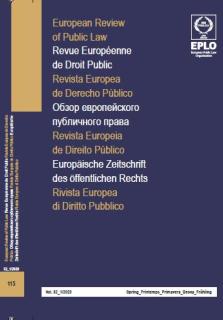
The Impact of the Financial Crisis on the Constitutions
of Eurozone Member States under Rescue Programs -
Greece as a Laboratory of Constitutional Theory
Professor of Constitutional Law (University of Thessaloniki), Former Deputy Prime Minister and Finance Minister (2011-2012), former Deputy Prime Minister and Minister of Foreign Affairs (2013-2015) of the Hellenic Republic
The financial crisis in the Eurozone and the entry of some Member States to rescue programs have brought about major changes in the institutional structure of the EU economic governance. They have also been the subject of a quite interesting case law in the CJEU and the ECtHR. However, this experience primarily affected the national legal order and national Constitutions. Experiencing three consecutive programs (2008-2018), Greece is the laboratory in which the resilience of the national Constitution and the European constitutional theory were tested. A number of rather serious issues were raised concerning the interpretation of the Constitution, the relationship between national Constitution, EU legal order and international law and the limits of the judicial review of austerity legislation. Moreover, questions arose concerning the regulatory content of the Constitution itself, either through informal constitutional changes or through the formal amendment process. The main finding of the study is that the national Constitution demonstrated resilience and adaptability. During the crisis, heated public debate arose concerning the internal and external sovereignty of a Member State in crisis, without violating the constitutional framework. The financial crisis did not function as a state of emergency in the legal sense of the term but as a real situation that affected the interpretation of the Constitution mainly through the concept of general interest and the principle of proportionality. The crisis has highlighted the importance of fiscal awareness as a parameter in the interpretation of the Constitution.
La crise financière dans la zone euro et l’entrée de certains Etats membres dans des programmes de sauvetage ont entraîné des changements majeurs dans la structure institutionnelle de la gouvernance économique de l’UE. Elles ont également fait l’objet d’une jurisprudence assez intéressante de la CJUE et de la Cour européenne des droits de l’homme. Cependant, cette expérience a surtout affecté l’ordre juridique national et les Constitutions nationales. La Grèce, qui a vécu l’expérience de trois programmes consécutifs (2008-2018), a été le laboratoire où ont été testées la résilience de la Constitution nationale et la théorie constitutionnelle européenne. Un certain nombre de problèmes assez graves ont été soulevés concernant l’interprétation de la Constitution, la relation entre la Constitution nationale, l’ordre juridique européen et le droit international ainsi que les limites du contrôle juridictionnel des lois d’austérité. En outre, des questions ont été soulevées concernant le contenu réglementaire de la Constitution elle-même, soit à travers des modifications constitutionnelles informelles, soit par le processus d’amendement formel. La principale conclusion de l’étude est que la Constitution nationale a fait preuve de résilience et d’adaptabilité. Pendant la crise, un débat public animé a eu lieu concernant la souveraineté interne et externe d’un Etat membre en crise, sans pour autant violer le cadre constitutionnel. La crise financière n’a pas fonctionné comme un état d’urgence au sens juridique du terme mais comme une situation réelle qui a affecté l’interprétation de la Constitution principalement à travers le concept d’intérêt général et le principe de proportionnalité. La crise a mis en évidence l’importance de la conscience fiscale comme paramètre d’interprétation de la Constitution.
* The text is based on Professor Venizelos’s introduction at the seminar that was organized by and hosted at Oriel College, Oxford, on October 18, 2018.





















